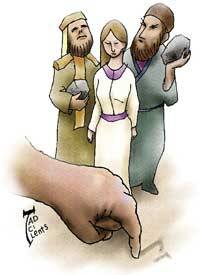The Finger of God
It is easy to point a finger at someone caught red-handed in a sinful act. While someone else is in the spotlight, the chances diminish that my own wrongdoings will be found out and draw others’ attention—at least for the moment. Joining the mob of accusers also keeps me from self-examination and the possibility of repentance. It is much easier to point out other peoples’ shortcomings.
In the Gospel today the case seems clear-cut. A woman is caught in the very act of adultery. The evidence is indisputable, and the law is clear. It is just a matter of carrying it out. Jesus’ opponents are not interested in the circumstances that led to the woman’s actions—and one must wonder how her partner escaped judgment when both were caught in the act! The scribes and Pharisees are intent on being able to charge Jesus with transgressing the law. They quote the law of Moses to Jesus and press him for his judgment. While they wait for an answer, Jesus bends down and begins to write on the ground with his finger.
Much ink has been spilled by commentators who speculate on what Jesus wrote. St. Jerome proposed that it was the sins of the accusers. Others suggest that Jesus was imitating Roman legal practice, where the judge first writes the sentence and then reads it aloud. Still others propose that Jesus is doodling, buying time while he ponders his response. I suggest that the Evangelist is making a connection with the giving of the law to Moses.
Ex 31:18 says, “When God finished speaking with Moses on Mount Sinai, he gave him the two tablets of the covenant, tablets of stone, written with the finger of God.” It is not the content of Jesus’ writing that is important here; otherwise the Evangelist would have told us what it said. It is Jesus’ action of writing with his finger, replicating God’s action in the giving of the law, that helps us understand that Jesus’ interpretation of the law is in line with God’s intent. The law was never intended as an instrument of condemnation but was to guide believers in a godly way of life.
Like Jesus’ opponents in the Gospel, Christian teachers and preachers have struggled to understand how Jesus could let a blatant sinner off without punishment. St. Ambrose worried that the Gospel could produce anxiety in the inexperienced and tried to dismiss the idea that Jesus could have made a mistake. John Calvin assured his followers that although Jesus remits our sins, he does not subvert the social order or abolish legal sentences and punishments. While the latter may be true, Jesus does, indeed, abolish the notion that our relationship with God is contained within rules and law. While these are necessary for the peaceable ordering of any organization, whether civil or religious, law does not express adequately how we relate with God. It is God’s freely given gift of forgiveness, offered to us in the person of Christ, that binds us to God and invites us to a new way of life. It is a gift that is replicated every time we offer forgiveness and compassion to one another.
A marvelous image is given us by Michelangelo on the ceiling of the Sistine Chapel in Rome: God, surrounded by cherubs, with his left arm draped around a female figure, strains his right arm forward, with his index finger extended toward Adam. Instead of pointing the finger of guilt at humankind, God is exerting every effort to draw the human creature into the divine loving embrace. Their fingers almost touch. If he wanted to, Adam could complete the connection.
This article also appeared in print, under the headline “The Finger of God,” in the March 15, 2010, issue.








